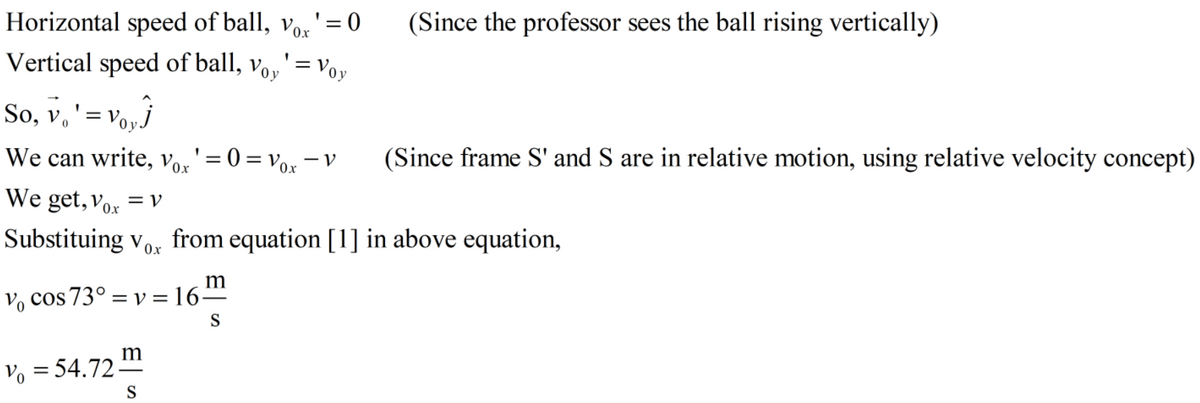A science student is riding on a flatcar of a train traveling along a strait, horizontal track at a constant speed of 16 m/s. The student throws a ball into the air along a path he judges to make an initial angle of 73° with the horizontal (toward the rear of the car) and to be in line with the track. The student's professor, who is standing on the ground nearby, observes the ball to rise vertically. With what initial speed does the professor see the ball rise? 47.26 m/s 45.28_m/s 40.6_m/s А. D. 43.1_m/s В. Е. 49.59_m/s С. F. 52.33_m/s
A science student is riding on a flatcar of a train traveling along a strait, horizontal track at a constant speed of 16 m/s. The student throws a ball into the air along a path he judges to make an initial angle of 73° with the horizontal (toward the rear of the car) and to be in line with the track. The student's professor, who is standing on the ground nearby, observes the ball to rise vertically. With what initial speed does the professor see the ball rise? 47.26 m/s 45.28_m/s 40.6_m/s А. D. 43.1_m/s В. Е. 49.59_m/s С. F. 52.33_m/s
College Physics
11th Edition
ISBN:9781305952300
Author:Raymond A. Serway, Chris Vuille
Publisher:Raymond A. Serway, Chris Vuille
Chapter1: Units, Trigonometry. And Vectors
Section: Chapter Questions
Problem 1CQ: Estimate the order of magnitude of the length, in meters, of each of the following; (a) a mouse, (b)...
Related questions
Question
Please show me how to set this up and get through it.

Transcribed Image Text:A science student is riding on a flatcar of a train traveling along a strait, horizontal track at a constant
speed of 16 m/s. The student throws a ball into the air along a path he judges to make an initial angle of
73° with the horizontal (toward the rear of the car) and to be in line with the track. The student's
professor, who is standing on the ground nearby, observes the ball to rise vertically. With what initial
speed does the professor see the ball rise?
47.26 m/s
45.28_m/s
40.6_m/s
А.
D.
43.1_m/s
В.
Е.
49.59_m/s
С.
F.
52.33_m/s
Expert Solution
Step 1
Conder,
two reference frames:
(1) In the student's reference frame (S),
the initial speed of the ball, v0=?
the angle with which the student throws the ball, θ=73°
(2) In the professor's reference frame (S'),
The professor sees the student moving in his reference frame at a speed, v=16 m/s
Now, writing the horizontal and vertical components of the speed of the ball in S reference frame:

Now, writing the horizontal and vertical components of the speed of the ball in S' reference frame:

Hence, the professor sees the ball rising with an initial speed of 54.72 m/s
Step by step
Solved in 2 steps with 2 images

Knowledge Booster
Learn more about
Need a deep-dive on the concept behind this application? Look no further. Learn more about this topic, physics and related others by exploring similar questions and additional content below.Recommended textbooks for you

College Physics
Physics
ISBN:
9781305952300
Author:
Raymond A. Serway, Chris Vuille
Publisher:
Cengage Learning

University Physics (14th Edition)
Physics
ISBN:
9780133969290
Author:
Hugh D. Young, Roger A. Freedman
Publisher:
PEARSON

Introduction To Quantum Mechanics
Physics
ISBN:
9781107189638
Author:
Griffiths, David J., Schroeter, Darrell F.
Publisher:
Cambridge University Press

College Physics
Physics
ISBN:
9781305952300
Author:
Raymond A. Serway, Chris Vuille
Publisher:
Cengage Learning

University Physics (14th Edition)
Physics
ISBN:
9780133969290
Author:
Hugh D. Young, Roger A. Freedman
Publisher:
PEARSON

Introduction To Quantum Mechanics
Physics
ISBN:
9781107189638
Author:
Griffiths, David J., Schroeter, Darrell F.
Publisher:
Cambridge University Press

Physics for Scientists and Engineers
Physics
ISBN:
9781337553278
Author:
Raymond A. Serway, John W. Jewett
Publisher:
Cengage Learning

Lecture- Tutorials for Introductory Astronomy
Physics
ISBN:
9780321820464
Author:
Edward E. Prather, Tim P. Slater, Jeff P. Adams, Gina Brissenden
Publisher:
Addison-Wesley

College Physics: A Strategic Approach (4th Editio…
Physics
ISBN:
9780134609034
Author:
Randall D. Knight (Professor Emeritus), Brian Jones, Stuart Field
Publisher:
PEARSON